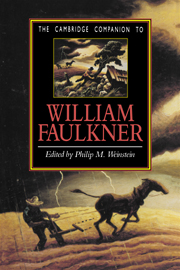7 - Race in Light in August
Word symbols and Obverse Reflections
from Part II - The World in the Texts
Published online by Cambridge University Press: 28 May 2006
Summary
In The Sound and the Fury, Quentin, reminding himself that while in the East he must “remember to think of [blacks[ as colored people not niggers” goes on to assert that a black person is “a form of behavior, a sort of obverse reflection of the white people he lives among” (86). Although Quentin’s reflections have obviously been conditioned by his Southern background and are hardly intended to serve as any sort of universally applicable commentary both his concern with the language of racial designation and his judgment that race is a conceptual and behavioral issue as much as (or rather more than) a biological one are salient. Moreover, they thematically anticipate Faulkner’s most profound meditation on the topic, Light in August. It is striking - and may seem paradoxical - that the Faulkner novel most centrally concerned with an issue that suffused so much of his corpus contains not a single significant character who is identifiably African-American, but that absence only emphasizes the text’s predominant concern with race as a linguistic and social construct rather than a biological given, its focus more on the concept of race than on actual race relations. In the course of the novel, Faulkner not only provides a provocative consideration of the issues surrounding racial notions in the American South in the early part of the twentieth century - indeed, in Western culture generally, if one takes into account the novel’s connection with important theoretical and historical writings about race - but, while investigating the operations of the concept of blackness, he also manages to explore the role of language in the construction of subjectivity.
- Type
- Chapter
- Information
- The Cambridge Companion to William Faulkner , pp. 146 - 167Publisher: Cambridge University PressPrint publication year: 1995
- 2
- Cited by

